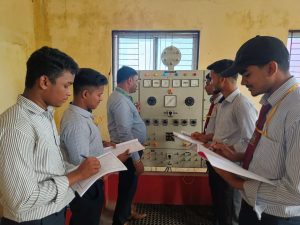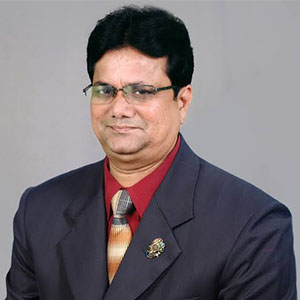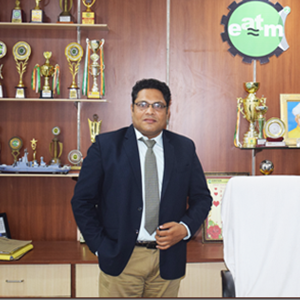Electrical Engineering
- Introduction
- HOD's Message
- Faculty Members
- Vision & Mission
- Courses Offered
- COs
- POs
- PEOs & PSOs
- Laboratory Facilities
- Opportunities
- Achievements
-
Seminar, Workshop,
Conference, FDP, STTP - Value Added Courses
- Student Project/Internship
 Electrical Engineering is a branch of Engineering that specialized in design, construct and practical use of Electrical System. Electrical engineering (sometimes referred to as electrical and electronic engineering) is a professional engineering discipline that deals with the study and application of electricity, electronics and electromagnetism. Now days the field now covers a range of sub-disciplines including those that deal with power, electronics, digital electronics, analog electronics, computer science, artificial intelligence, control systems, signal processing and telecommunications.
Electrical Engineering is a branch of Engineering that specialized in design, construct and practical use of Electrical System. Electrical engineering (sometimes referred to as electrical and electronic engineering) is a professional engineering discipline that deals with the study and application of electricity, electronics and electromagnetism. Now days the field now covers a range of sub-disciplines including those that deal with power, electronics, digital electronics, analog electronics, computer science, artificial intelligence, control systems, signal processing and telecommunications.
Electrical engineers typically possess an academic degree with a major in electrical engineering. The length of study for such a degree is usually four years and the completed degree may be designated as a Bachelor in Technology in our University. Students then choose to specialize in one or more sub-disciplines toward the end of the degree. Typically, academic institutions that offer education and training for the conferment of an engineering diploma are accredited by some governing body made up of single or multiple entities. Accreditation When looking for an academic institution of higher learning, the student should always check to make sure that the institution has proper and up to date accreditation by a respected agency. Some employers may not offer employment for someone who has graduated with an engineering degree from an academic institution that does not hold engineering accreditation.
I on the behalf of the Department of Electrical Engineering would like to extend my sincere welcome to all the future technocrats of the nation at Einstein Academy of Technology and Management, Khurdha, Odisha. We are proud to take the opportunity to educate future visionaries, encourage research activities and take various initiatives that validate transformation power of Electrical Engineering. Our department has recorded consistent enhancement in its academic research & placement performance. We offer a wide range of Value added courses so as to keep our students updated to the recent change in the requirement of the industry and also to meet the basic needs of all our stake holders. We hope that all our students have been well accepted in their respective job profiles and have been consistently exceeding the expectations of the industries. The department feels proud to be a part of a strong Alumini network, many of whom hold influential positions in the core sectors. We are looking forward to have much talented students, academicians and professionals to join us and help in maintaining a competitive learning atmosphere in the campus.
HOD,EE
VISION
MISSION
|
Under Graduate (B. Tech) |
Electrical Engineering (60 Intake)
|
Programme Outcomes (POs)
PO1: Engineering knowledge: Apply the knowledge of mathematics, science, engineering fundamentals, and an engineering specialization to the solution of complex engineering problems.
PO2: Problem analysis: Identify, formulate, review research literature, and analyze complex engineering problems reaching substantiated conclusions using first principles of mathematics, natural sciences, and engineering sciences
PO3: Design/development of solutions: Design solutions for complex engineering problems and design system components or processes that meet the specified needs with appropriate consideration for the public health and safety, and the cultural, societal, and environmental considerations.
PO4: Conduct investigations of complex problems: Use research-based knowledge and research methods including design of experiments, analysis and interpretation of data, and synthesis of the information to provide valid conclusions.
PO5: Modern tool usage: Create, select, and apply appropriate techniques, resources, and modern engineering and IT tools including prediction and modeling to complex engineering activities with an understanding of the limitations.
PO6: The engineer and society: Apply reasoning informed by the contextual knowledge to assess societal, health, safety, legal and cultural issues and the consequent responsibilities relevant to the professional engineering practice.
PO7: Environment and sustainability: Understand the impact of the professional engineering solutions in societal and environmental contexts, and demonstrate the knowledge of, and need for sustainable development.
PO8: Ethics: Apply ethical principles and commit to professional ethics and responsibilities and norms of the engineering practice.
PO9: Individual and team work: Function effectively as an individual, and as a member or leader in diverse teams, and in multidisciplinary settings.
PO10: Communication: Communicate effectively on complex engineering activities with the engineering community and with society at large, such as, being able to comprehend and write effective reports and design documentation, make effective presentations, and give and receive clear instructions.
PO11: Project management and finance: Demonstrate knowledge and understanding of the engineering and management principles and apply these to one’s own work, as a member and leader in a team, to manage projects and in multidisciplinary environments.
PO12: Life-long learning: Recognize the need for, and have the preparation and ability to engage in independent and life-long learning in the broadest context of technological change.
PROGRAM EDUCATIONAL OBJECTIVES (PEOs)
PEO-1: Graduates will acquire fundamental knowledge in basic and core subjects, and implement the same in solving, planning, executing the real-life problems in the field of Mechanical Engineering.
PEO-2: Graduates will be able to apply their skills in experimentation, analysis, computation, simulation to find out workable solutions to technological challenges in core and allied areas of Mechanical Engineering including higher studies.
PEO-3: Graduates will be able to possess good communication skill, all round personality development, ethical practices, leadership quality and understand his role towards the society and environmental sustainability.
PROGRAM SPECIFIC OUTCOMES (PSOs)
PSO1: Mechanical Graduates will possess a sound technical knowledge and will be capable to develop core competency in diversified fields such as production, design, thermal, industrial and other allied sectors.
PSO2: Graduates will exhibit effective communication, leadership, team building, problem-solving and decision-making skills along with software and creative knowledge by understanding contemporary issues.
PSO3: Graduates will adapt to the rapidly changing environment in the areas of mechanical engineering and scale new heights in their profession through lifelong learning.v
1: Apply the knowledge of mathematics, science, engineering fundamentals, and an engineering specialization to the solution of complex engineering problems.
2: Identify, formulate, review research literature, and analyze complex engineering problems reaching substantiated conclusions using first principles of mathematics, natural sciences, and engineering sciences.
3: Design solutions for complex engineering problems and design system components or processes that meet the specified needs with appropriate consideration for the public health and safety, and the cultural, societal, and environmental considerations.
4: Use research-based knowledge and research methods including design of experiments, analysis and interpretation of data, and synthesis of the information to provide valid conclusions.
5: Create, select, and apply appropriate techniques, resources, and modern engineering and IT tools including prediction and modeling to complex engineering activities with an understanding of the limitations.
6: Apply reasoning informed by the contextual knowledge to assess societal, health, safety, legal and cultural issues and the consequent responsibilities relevant to the professional engineering practice.
7: Understand the impact of the professional engineering solutions in societal and environmental contexts, and demonstrate the knowledge of, and need for sustainable development.
8: Apply ethical principles and commit to professional ethics and responsibilities and norms of the engineering practice.
9: Function effectively as an individual, and as a member or leader in diverse teams, and in multidisciplinary settings.
10: Communicate effectively on complex engineering activities with the engineering community and with society at large, such as, being able to comprehend and write effective reports and design documentation, make effective presentations, and give and receive clear instructions.
11: Demonstrate knowledge and understanding of the engineering and management principles and apply these to one’s own work, as a member and leader in a team, to manage projects and in multidisciplinary environments.
12: Recognize the need for, and have the preparation and ability to engage in independent and life-long learning in the broadest context of technological change.
Page Under Construction..
Page Under Construction..
- ADVANCE DIPLOMA IN MACHINE MAINTENANCE AND AUTOMATION
- VLSI DESIGN
- MATLAB





